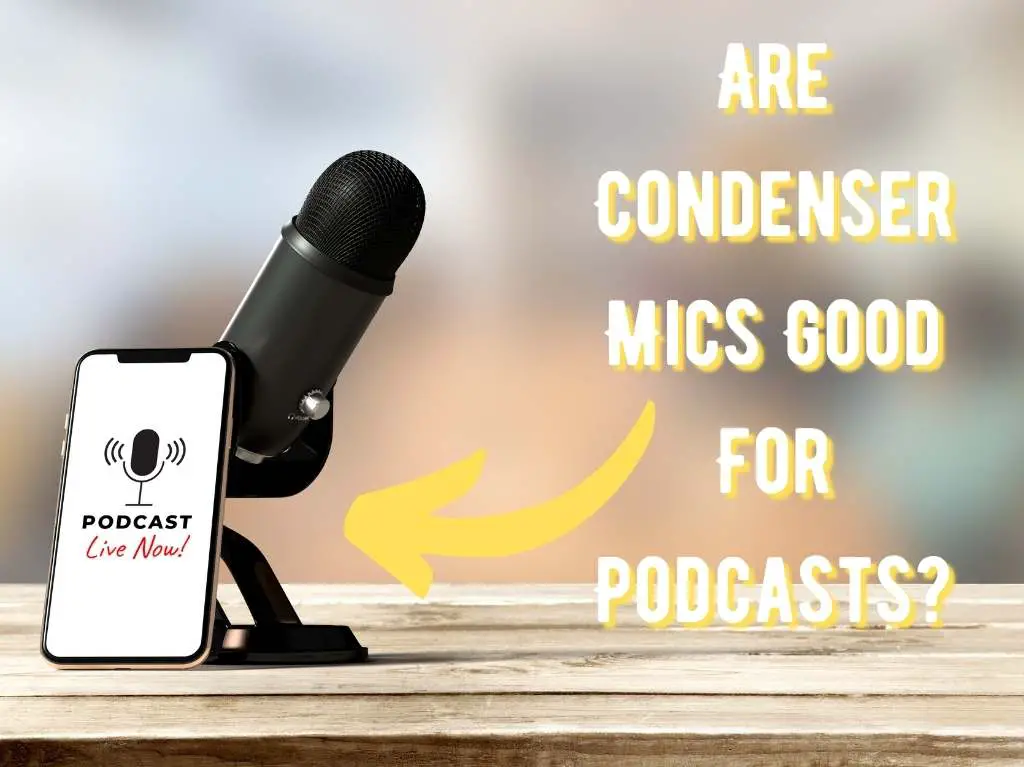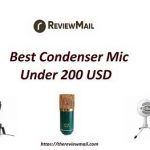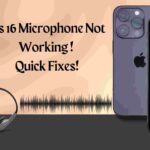Condenser microphones are often thought of as the best type of microphone for podcasting, but this is not always the case. For that reason we discuss in this article deeply about your query “Are condenser mics good for podcasts?”
While condenser microphones do tend to produce high-quality audio recordings, they can also be quite delicate and expensive. If you are just starting out with podcasting, it might be a good idea to try using a less expensive and more durable microphone first.
Ultimately, the best type of microphone for podcasting is the one that produces the sound quality that you are looking for.
If you’re thinking about starting a podcast, you may be wondering if condenser microphones are a good option. While they are often used in professional recording studios, condenser mics can also be a great choice for podcasts.
Table of Contents
Are Condenser Mics Good for Podcasts?
Yes, condenser microphones are commonly used and considered good for podcasting. Condenser mics are known for their sensitivity and ability to capture a wide range of frequencies, making them suitable for capturing the nuances of spoken voice.
Here are some reasons why condenser microphones are often preferred for podcasting:
- Sensitivity: Condenser microphones are more sensitive than dynamic microphones, which means they can capture a broader range of frequencies and produce a more detailed and accurate representation of your voice.
- Low Noise: Condenser microphones typically have lower self-noise compared to dynamic microphones. This is important for recording in quiet environments, as it helps minimize any unwanted background noise.
- High-Quality Audio: Condenser mics are known for producing high-quality audio recordings with a full and rich sound, which is desirable for podcasting where clear and engaging audio is crucial.
- Versatility: Condenser microphones are versatile and can be used for various recording situations. Many podcasters appreciate the flexibility of condenser mics for capturing different voices and tones.
However, it’s important to note that condenser microphones are more sensitive to ambient noise and may pick up sounds from the environment, such as computer fans or air conditioning. To mitigate this, podcasters often use pop filters and shock mounts to reduce plosive sounds and vibrations.
Ultimately, the best microphone for your podcast depends on your specific needs, recording environment, and budget. Some popular condenser microphones for podcasting include the Audio-Technica ATR2100x-USB, Blue Yeti, and Rode NT-USB.
Benefits of using condenser microphones for your podcast:
1. They capture sound clearly.
Condenser microphones are known for their ability to capture sound accurately and clearly. This is important for podcasts because you want your listeners to be able to hear everything clearly, without any background noise or distractions.
2. They offer flexibility.
Condenser microphones come in a variety of styles and sizes, so you can find one that will work well in your particular recording setup. Whether you’re recording in a professional studio or in your own home office, there’s a condenser mic that will suit your needs.
3. They’re affordable.
While professional-grade condenser microphones can be quite expensive, there are many affordable options available that still offer excellent sound quality. This makes them a great option for podcasters on a budget.
4. They’re easy to use.
If you’re new to podcasting, condenser microphones can be easier to use than other types of microphone because they don’t require as much setup or technical knowledge. Simply plug it in and start recording!
Best Dynamic Microphone for Podcasting
If you’re looking for the best dynamic microphone for podcasting, you’ve come to the right place. In this blog post, we’ll go over what to look for in a dynamic microphone and recommend our top three picks. When it comes to podcasting, there are two main types of microphones: condenser and dynamic.
Condenser microphones are great for capturing clear audio, but they can be expensive. Dynamic microphones are more affordable and still provide good sound quality. That’s why we recommend using a dynamic microphone for podcasting.
When choosing a dynamic microphone for your podcast, there are a few things to keep in mind:
Pickup Pattern:
The pickup pattern is how the microphone captures sound. For podcasting, we recommend using a cardioid or hyper cardioid pickup pattern.
These patterns help to reduce background noise and focus on your voice.
Condenser Microphone
A condenser microphone is a type of microphone that uses an electrostatic charge to convert sound waves into electrical signals. It is the most common type of microphone used in recording studios, and is also widely used in live sound reinforcement applications. Condenser microphones are known for their high quality and accuracy, and are often used for capturing delicate sounds such as vocals and acoustic instruments.
The term “condenser” refers to the fact that these microphones use a capacitor to store electrical energy. The capacitor consists of two conductive plates (the “plates”) with a dielectric material between them. When sound waves hit the first plate, it vibrates and causes a change in the electric field between the two plates.
This change is converted into an electrical signal by the microphone’s circuitry, which can then be amplified or recorded. Condenser microphones typically have a higher sensitivity than other types of microphones, which means they can pick up very soft sounds. They also have a wider frequency response than other types of microphones, meaning they can reproduce a greater range of frequencies (from low bass notes to high treble notes).
This makes them ideal for recording music with a wide range of pitches, such as classical music or rock music. One downside of condenser microphones is that they require phantom power – meaning they need to be connected to an external power source in order to work properly. However, many audio interfaces and mixing consoles provide phantom power, so this is usually not a problem.
Also Read: Best affordable condenser mics for vocals
Are Dynamic Mics Good for Podcasts
Dynamic microphones are a great option for podcasting because they are less expensive than condenser microphones and they don’t require an external power source. They are also more rugged and can handle higher SPLs (sound pressure levels), making them ideal for recording in loud environments.
However, dynamic microphones tend to have a narrower frequency response than condenser microphones, so they may not capture all the nuances of your voice.
Condenser Vs Dynamic Mic for Podcasting
If you’re just getting started in podcasting, you may be wondering what kind of microphone you should use. There are two main types of microphones that are commonly used for podcasting: condenser microphones and dynamic microphones. So, which one is better for podcasting?
Condenser microphones are typically more sensitive than dynamic microphones, which means they can pick up a wider range of frequencies. This can make them sound better overall, but it also means they’re more likely to pick up background noise. If you’re recording in a less-than-ideal environment, a condenser microphone may not be the best choice.
Dynamic microphones, on the other hand, are less sensitive and therefore won’t pick up as much background noise. They also don’t require power from an external source (like a battery), which can be handy if you’re recording on the go. However, dynamic microphones don’t usually sound as good as condenser microphones do.
So, which type of microphone is best for podcasting? It really depends on your specific needs and situation. If you want the best possible sound quality and you’re recording in a quiet environment, go with a condenser microphone.
But if you need a microphone that’s more forgiving of background noise and is easier to use on the go, go with a dynamic microphone.
Are Lavalier Mics Good for Podcasting
If you’re looking to get into podcasting, you might be wondering if a lavalier mic is a good option. Let’s take a look at what lavalier microphones are and whether or not they’re well-suited for podcasting. Lavalier microphones are small, clip-on mics that can be attached to clothing.
They’re often used in live settings, like the atre productions or conferences, because they allow the speaker to move around freely without being tethered to a traditional stand-mounted mic. So, are lavalier mics good for podcasting? It depends.
If you plan on doing any sort of movement while recording your podcast (like pacing back and forth), then a lav mic will definitely be beneficial.
However, if you’ll be mostly stationary while recording, there are other types of microphones that may better suit your needs (like desk mics or boom mics).
Another thing to consider is that lavalier microphones can sometimes pick up unwanted noise from clothing rustling or body movements.
So if you’re planning on using a lav mic for your podcast, make sure you test it out first to see how it sounds in your particular recording environment.

Is a Dynamic Or Condenser Mic Better for Podcast?
If you’re planning to start a podcast, one of the first decisions you’ll need to make is which type of microphone to use. Both dynamic and condenser microphones can be used for podcasts, but each has its own advantages and disadvantages.
Here’s a look at some of the key factors you should consider when choosing a microphone for your podcast:
Sound quality: In general, condenser microphones tend to have better sound quality than dynamic microphones. This is because condensers have a wider frequency response and can capture more subtle details in the audio. However, there are high-quality dynamic microphones available that can produce excellent sound quality as well.
Price: Condenser microphones are usually more expensive than dynamic microphones, so this is something to keep in mind if you’re on a budget. That said, you don’t necessarily need to spend a lot of money to get a good quality microphone – there are some great affordable options available.
Versatility: Dynamic microphones are typically more versatile than condenser microphones since they can be used in a variety of settings without requiring any special equipment.
For example, dynamic mics don’t need phantom power and can be used with lower-end recording devices. On the other hand, condenser mics often require phantom power and may not work properly with lower-end gear.
Ease of use: Dynamic microphones are generally easier to use than condenser microphones since they don’t require any special setup or equipment.
Simply plug them into your recording device and you’re ready to go. Condenser mics, on the other hand, often require Phantom power and may need to be placed in specific positions in order to get the best sound quality possible. This can make them more challenging to use for beginners or those who aren’t familiar with audio setups.
Also Read: Best Condenser Mic Under 200
What Type of Microphone is Best for Podcasts?
There are a few different types of microphones that can be used for podcasts, but the best type of microphone is the XLR microphone. This type of microphone is most commonly used in professional recording studios and offers the best sound quality. If you’re looking for a cheaper option, then an USB microphone is a good choice.
These microphones are typically less expensive and offer decent sound quality.
What are Condenser Microphones Best For?
Condenser microphones are often used in studios and live settings because they are able to capture a wide frequency range and produce high-quality sound. They are also more sensitive than other types of microphones, so they can pick up subtle details in the audio signal. If you’re looking for a microphone that will give you clear, accurate sound quality, then a condenser microphone is a good option.
However, because they are more sensitive than other types of microphones, they may also pick up background noise more easily. If you’ll be using your microphone in a noisy environment, it’s important to choose one with a low self-noise rating.
Dynamic Vs. Condenser Microphone – Which is best for Streaming?
Conclusion
If you’re thinking about starting a podcast, you may be wondering if a condenser mic is the right choice. While there are some benefits to using a condenser mic, there are also some drawbacks that you should be aware of before making your decision. One of the biggest advantages of using a condenser mic is that they tend to produce very clear sound quality.
This is ideal for podcasts, as you want your listeners to be able to hear everything clearly. Additionally, condenser mics are very sensitive, so they can pick up even the slightest sounds. This can be both a good and bad thing – on the one hand, it means that your podcast will sound great; on the other hand, it means that any background noise will also be picked up by the microphone.
Another advantage of using a condenser mic is that they’re relatively inexpensive. You can find some decent quality models for under $100, which makes them a great option if you’re just starting out with podcasting. However, keep in mind that you get what you pay for – cheaper models may not provide the same level of sound quality as more expensive ones.
The main disadvantage of using a condenser mic for podcasts is that they require phantom power in order to work properly. This means that you’ll need an audio interface or mixer with phantom power capabilities in order to use one. Additionally, because they’re so sensitive, condenser mics can often pick up unwanted noises from things like air conditioners or computers (if you’re recording in an office).
If this is something that concerns you, there are other types of microphones available that don’t require phantom power and aren’t as sensitive to background noise.
Relevant Post:
Are Condenser Mics Good for Streaming?
How to Connect Condenser Mic to Bluetooth Speaker?
How to Connect Condenser Mic to Mac?
How to Connect Condenser Mic to Speaker?
How to Connect a Condenser Mic to a Pc?
Are you a user of a condenser mic?
How to use condenser mic on tiktok?
Can you record guitar with a condenser mic?

Williams Kane is a blogger and writer. He’s passionate about writing and connecting with the community, especially when it comes to sharing his ideas through writing.
I am a versatile author with a passion for exploring a wide range of topics on our multi-niche website. With a background in research and a love for writing, I bring a unique blend of expertise to our platform.
My journey began in the world of science, where I earned a degree in biology and developed a deep fascination for the natural world. This background enables me to delve into topics related to ecology, environmental conservation, and the wonders of the animal kingdom.
However, my curiosity knows no bounds, and I have ventured into various other niches as well. From technology trends and digital innovations to health and wellness tips, I strive to provide well-researched and engaging content that informs and entertains our diverse audience.
Furthermore, my dedication to staying current with the latest developments in each niche ensures that our readers receive up-to-date and reliable information. Whether it’s deciphering complex scientific concepts or simplifying tech jargon, I take pride in making complex subjects accessible to all.
Join me on our multi-niche journey, where we explore the depths of knowledge and share insights on a multitude of topics to inspire, educate, and entertain.





